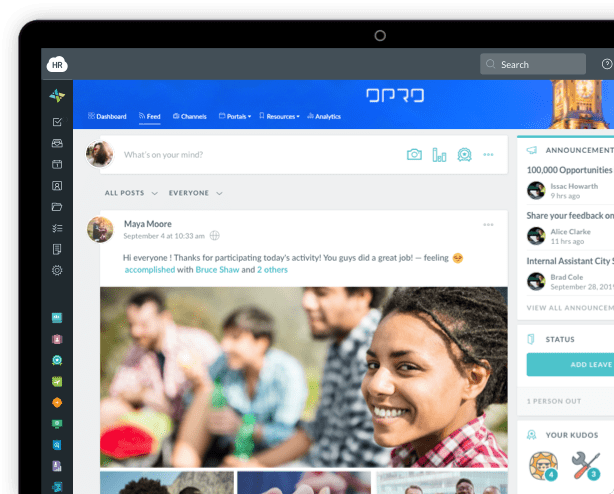A Guide to Communication in Human Resources
.png)


 Cut onboarding time
by 60%—here's the
Ultimate Checklist
that helped do it.
Cut onboarding time
by 60%—here's the
Ultimate Checklist
that helped do it.

Humans are often cited as the most important resource a business can access. Without a continual common effort to advance projects, focus on goals, and overcome obstacles, businesses can’t succeed. With that in mind, it makes sense that organizations around the globe use their human resources department as a central force to promote healthy working environments and improve employee satisfaction.
The total market cap for human resource management is continually growing, expected to sustain a 12.7% CAGR from 2023 to 2030. With the sheer amount of money that comes into this industry, it has always been a hotbed for new software, products, and supporting platforms. Yet, despite these useful tools, the most important aspect of any HR manager’s job is to communicate concisely and clearly.
In this article, we’ll dive into the world of HR communication, demonstrating the leading principles that managers can use to streamline their email communications. We’ll touch on useful tips, strategies, and guidelines that make email communication in HR a total breeze.
Let’s dive right in.
Why Is Communication in HR Important?
Human resources is the sector in which people are the motivation, aim, and main point of discussion. Considering every company needs people to run effectively, HR is a staple of the vast majority of businesses around the globe. As HR is the first point of contact with new employees and the final point with leaving members, they manage the whole lifecycle.
Due to this sphere of influence, there are a number of reasons why effective communication is important:
-
Boost Employee Engagement – Employee engagement is a direct result of the atmosphere that an HR team builds and enables. If an employee ever feels frustrated, they should always be able to come to the HR team to handle any problems or stress. As a touchpoint for employee mental health, HR will be able to remedy any areas where.
-
Improve Talent Retention – Nothing is more frustrating than seeing your top performers walk out the door. By focusing on a continual stream of high-quality communication between HR and employees, you can find out what would make employees stay and work toward giving it to them.
-
Increase Workplace Productivity – People work best when they feel valued. By ensuring that everyone can share their opinions and know they matter, your business can boost productivity and streamline the employee experience.
-
Create a Better Workplace Culture – A great HR team is one of the driving forces that create a winning workplace culture. By collecting ideas, improvements, and complaints from employees, you’ll be able to overcome them and work toward a more positive environment for all. Not only will your employees thank you, but you’ll see higher productivity and longer employee retention.
While not exhaustive, these four main reasons demonstrate the span of importance that HR has. Without the ability to effectively manage people, businesses will fail their employees and find it hard to grow.

Core Strategies to Promote Effective Email Communication in HR
Human resources teams are the core of every single business, managing the entire employee lifecycle and ensuring that workers are happy with their time at a business. Without a clear understanding of how to discuss, share information, and communicate in an effective way, HR teams will have a tough time getting much done.
In order to improve email communication, here are some main strategies that you can use to boost your writing and comms skills.
Use Precise Language
Emails in HR are notoriously of a delicate nature. While we all love congratulating new employee on their position and offering them help through the onboarding process, HR has to handle uncomfortable conversations just as frequently. Due to this, emails in HR are often going to be a document that will be used in other conversations, referenced by lawyers, and even scrutinized.
Considering the high-stakes emailing that many HR agents have to operate with, it’s always a good idea to use precise language where you can. Precise language, which is where you say exactly what you mean with little room for ambiguity, will help you avoid any unwanted scenarios.
Instead of beating around the bush, it’s always a better idea to be specific in the language you use. Beyond just avoiding uncertain future situations, this also helps to reduce the size of your emails. Using precise language will help you be more concise, helping employees and yourself while doing so.
Social Intranet Software that Encourages Employee Communication

Use Email Signatures
Email is, by nature, a short and concise medium. Without a few pleasantries, you’re able to get right down to the core subject of the email, making it efficient and useful. Yet, over the years of being a dominating method of communication, numerous additions and complementary software add-ons have been established to help get more from every email.
A great example of this is email signature software, which allows you to include a range of additional information in every email you send. For HR teams, email signatures are a wonderful place to include information about the role you have and the department that you belong to. By including these elements, you are able to instantly let anyone who you email know who you are and a potential motive for your email.
Email signatures have advanced over the years, with integrations now allowing HR departments to include a huge amount of additional information. For example, alongside your personal information, you can also include a link to an internal HR survey. When an employee clicks on this, they’re able to give feedback to the company as a whole.
By establishing an easy method of sharing feedback in an anonymous way, HR teams empower their companies to direct them toward methods of improving employee satisfaction. While only taking up one small part of your email signature, this can be a fantastic addition.
Final Thoughts
Great communication and human resources should, in theory, go hand in hand. Without the ability to clearly, concisely, and effectively communicate your ideas over email, HR managers are missing out on a core part of their job role. Being able to use email as a powerful tool to not only message but share information makes it one of the most powerful tools that HR teams have available to them.
By refining communication over email in human resources, teams can get more from every email they send. Considering how important HR is in improving employee satisfaction and decreasing employee churn, mastering this tool is of vital importance. Over time, a stronger HR team will lead to a better, more effective company dynamic.
Author Bio:
This article is written by a marketing team member at HR Cloud. HR Cloud is a leading provider of proven HR solutions, including recruiting, onboarding, employee communications & engagement, and rewards & recognition. Our user-friendly software increases employee productivity, delivers time and cost savings, and minimizes compliance risk.
Keep Reading
Best Onboarding Practices for Manufacturing Companies: 15 Proven Tactics That Boost Retention
"Three simple changes to our onboarding process cut our 30-day turnover from 28% to 12%.
Equity in the Workplace: A Practical Guide to Building Fairness and Opportunity
Workplace equity shouldn't be an aspiration—it should be the foundation of how
7 Employee Relations Responsibilities That Transform Workplace Culture
Employee relations shapes how people experience work every single day. It's not just
Like What You Hear?
We'd love to chat with you more about how HR Cloud® can support your business's HR needs. Book Your Free Demo

Build a Culture of Recognition. Boost Engagement. Guaranteed.
Workmates empowers employees to stay informed, connected, and appreciated—whether they’re on the front line, in the office, or remote. Recognition drives 12x higher engagement.Trusted by industry leaders in every sector




Cut Onboarding Costs by 60%.
Take the confusion and follow-ups out of onboarding with automated workflows, digital forms, and structured portals—so new hires ramp faster 3X quicker.Trusted by industry leaders in every sector





